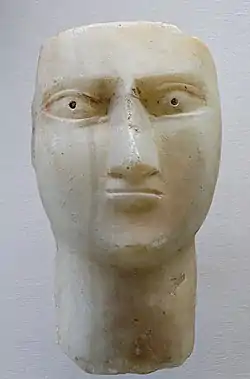alabastro
Esperanto
Noun
alabastro (accusative singular alabastron, plural alabastroj, accusative plural alabastrojn)
- alabaster
- Li kopiis La Pietá de Michelangelo en alabastro.
- He copied Michaelangelo's Pietá in alabaster.
Italian
Etymology
From Latin alabastrum, or borrowed from Ancient Greek ἀλάβαστρος (alábastros), from earlier ἀλάβαστος (alábastos, “vase made of alabaster”).
Latin
Portuguese
Etymology
Borrowed from Latin alabastrum, from Ancient Greek ἀλάβαστρος (alábastros), from earlier ἀλάβαστος (alábastos, “vase made of alabaster”).
See also
Spanish

Etymology
Borrowed from Latin alabastrum, from Ancient Greek ἀλάβαστρος (alábastros), from earlier ἀλάβαστος (alábastos, “vase made of alabaster”). This may further derive from Egyptian ꜥj-r-bꜣstjt (“vessel of the Egyptian goddess Bast”).
Pronunciation
- IPA(key): /alaˈbastɾo/, [alaˈβast̪ɾo]
Derived terms
- alabastrado
- alabastrino
Further reading
- “alabastro” in Diccionario de la lengua española, Vigésima tercera edición, Real Academia Española, 2014.
Tagalog
Etymology
Borrowed from Spanish alabastro (“alabaster”), from Old French alabastre, from Latin alabaster (“box for perfume made of alabaster”), from Ancient Greek ἀλάβαστρος (alábastros), from earlier ἀλάβαστος (alábastos, “vase made of alabaster”). This may further derive from Egyptian ꜥj-r-bꜣstjt (“vessel of the Egyptian goddess Bast”).